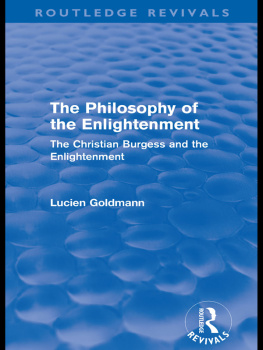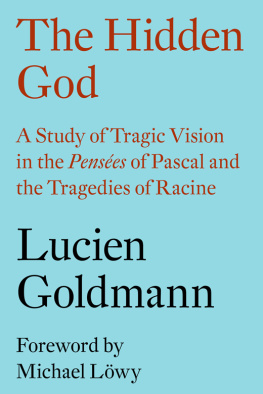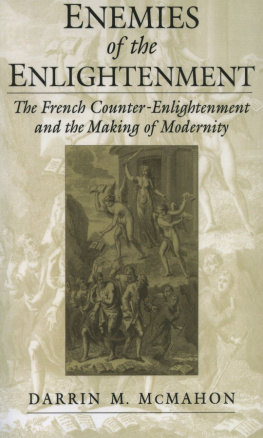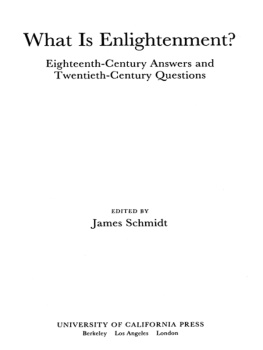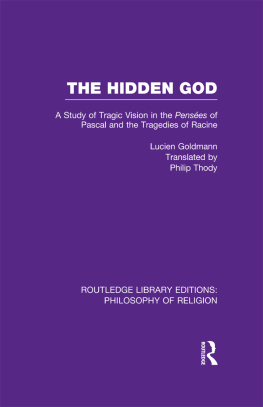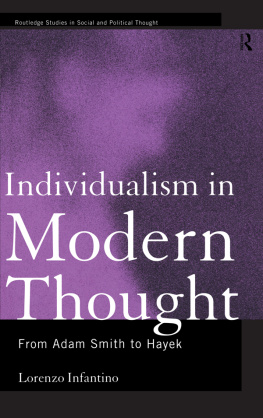Routledge Revivals
The Philosophy of the Enlightenment
In this reissue, originally published in English in 1973, French philosopher Lucien Goldmann turns his attention to the Enlightenment of the eighteenth century, the great age of liberalism and individualism and analyses the mental structures of the outlook of the philosophes, who showed that the ancien regime and the privileges of the Church were irrational anachronisms, and pleaded for institutions founded on reason.
In assessing the strengths and limitations of individualism, Goldmann considers the achievements and limitations of the Enlightenment. He discusses the views of Hegel and Marx and examines the relationship between liberal scepticism and traditional Christianity to point the way to the possible reconciliation of the two seemingly incompatible world visions of East and West today.
The Philosophy of the Enlightenment
The Christian Burgess and the Enlightenment
Lucien Goldmann
Translated by
Henry Maas
Originally published in 1968 as
Der christliche Brger und die Aufklrung
First published in Great Britain in 1973
by Routledge & Kegan Paul Ltd
This edition first published in 2010 by Routledge
2 Park Square, Milton Park, Abingdon, Oxon, OX14 4RN
Simultaneously published in the USA and Canada
by Routledge
270 Madison Avenue, New York, NY 10016
Routledge is an imprint of the Taylor & Francis Group, an informa business
This edition published in the Taylor & Francis e-Library, 2009.
To purchase your own copy of this or any of Taylor & Francis or Routledges collection of thousands of eBooks please go to www.eBookstore.tandf.co.uk.
1968 Hermann Luchterland Verlag GmbH
English translation 1973 Routledge & Kegan Paul Ltd
All rights reserved. No part of this book may be reprinted or reproduced or
utilised in any form or by any electronic, mechanical, or other means, now
known or hereafter invented, including photocopying and recording, or in any
information storage or retrieval system, without permission in writing from the
publishers.
Publishers Note
The publisher has gone to great lengths to ensure the quality of this reprint but
points out that some imperfections in the original copies may be apparent.
Disclaimer
The publisher has made every effort to trace copyright holders and welcomes
correspondence from those they have been unable to contact.
ISBN 0-203-85430-6 Master e-book ISBN
ISBN 13:978-0-415-57365-8 (hbk)
ISBN 13:978-0-203-85430-3 (ebk)
ISBN 10:0-415-57365-3 (hbk)
ISBN 10:0-203-85430-6 (ebk)
The Philosophy of the Enlightenment
By the same author
The Hidden God
The Philosophy of the Enlieghtenment
The Christian Burgess and the Enlightenment
Lucien Goldmann
Translated by
Henry Maas

Routledge & Kegan Paul London
Originally published in 1968 as
Der christliche Brger und die Aufklrung
This edition published in the Taylor & Francis e-Library, 2009.
To purchase your own copy of this or any of Taylor & Francis or Routledges collection of thousands of eBooks please go to www.eBookstore.tandf.co.uk.
1968 by Hermann Luchterhand Verlag GmbH
First published in Great Britain in 1973
by Routledge & Kegan Paul Ltd
Broadway House, 6874 Carter Lane
London EC4V 5EL
English translation Routledge & Kegan Paul Ltd 1973
No part of this book may be reproduced in
any form without permission from the
publisher, except for the quotation of brief
passages in criticism
ISBN 0-203-85430-6 Master e-book ISBN
ISBN 0 7100 7493 x
Contents
Translators Note
This essay was written in German and first published in 1968 under the title Der christliche Brger und die Aufklrung. A French version (by Irne Petit) entitled La Philosophie des Lumires was included in Lucien Goldmanns collection of essays Structures mentales et creation culturelle (Paris, 1970). This translation follows the original German text, incorporating further matter from the French edition and some additional corrections.
Preface
The following essay was originally written in 1960, in response to a commission from a German publisher, as the chapter on The Enlightenment and Christianity in a projected history of Christian thought. In the event the book did not appear, and the publisher restored the copyright to me.
But for the original commission I should probably never have written on the Enlightenment, and certainly not without lengthy research. I should also have given less space to the relation between it and Christianity.
None the less the manuscript, such as it is, possesses a certain interest and may be worth publishing so long as the reader understands how it came into being. Perhaps, too, he may feel that I have compensated for the lack of scholarly research to some extent by developing certain hypotheses that I should hardly have ventured to advance in a more substantial work.
L.G.
Paris, May 1967
I
The Structure of the Enlightenment
The Encyclopdie
Eighteenth-century France is the country of the Enlightenment in its most fully developed and most thorough form; and the Encyclopdie directed by dAlembert and Diderot is both a kind of symbol and a programme for the whole movement.
The Encyclopdie was of course only a part of a wider intellectual movement, and many important thinkers of the Enlightenment, including Voltaire, Rousseau, Helvtius and dHolbach, made only occasional small contributions or none at all. None the less they maintained close links with the group that produced the Encyclopdie and though there are major differences between them, these concerned limited areas of their thought but not the idea itself of the Encyclopdie as central to the movement.
The Encyclopdie does not stand alone but is merely the bestknown and largest undertaking of a whole series, from Bayles Dictionnaire historique et critique to Voltaires Dictionnaire philosophique. But if the Encyclopdie is specially representative of the movement, that is because both the contents themselves and the principles on which they are arranged express two leading features of the fundamental ideas of the Enlightenment:
(a) the great importance attached to making knowledge as comprehensive as possible;
(b) the idea that this knowledge is a sum of items of information to be conveyed in alphabetical order.
These of course are only approximations, and greater precision is needed if we are to avoid confusion. The writers of the Enlightenment always thought of knowledge in close connection with action. But they regarded human practice (Praxis), both in its effects on nature and in its social and historical consequences, as individual action, or the simultaneous action of individuals in large numbers, and as the application of knowledge acquired by the intellect. Knowledge, whether of nature or of society, is

